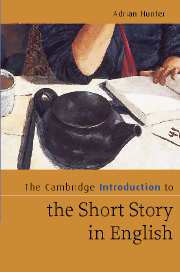Book contents
- Frontmatter
- Contents
- Acknowledgements
- Introduction
- Part I The nineteenth century
- Part II The modernist short story
- Part III Post-modernist stories
- Part IV Postcolonial and other stories
- Introduction: a ‘minor’ literature?
- Chapter 11 Frank Sargeson and Marjorie Barnard
- Chapter 12 James Kelman and Chinua Achebe
- Chapter 13 Alice Munro
- Notes
- Guide to further reading
- Index
- Titles in this series:
Chapter 12 - James Kelman and Chinua Achebe
Published online by Cambridge University Press: 05 June 2012
- Frontmatter
- Contents
- Acknowledgements
- Introduction
- Part I The nineteenth century
- Part II The modernist short story
- Part III Post-modernist stories
- Part IV Postcolonial and other stories
- Introduction: a ‘minor’ literature?
- Chapter 11 Frank Sargeson and Marjorie Barnard
- Chapter 12 James Kelman and Chinua Achebe
- Chapter 13 Alice Munro
- Notes
- Guide to further reading
- Index
- Titles in this series:
Summary
‘I wanted to write and remain a member of my own community’. So declares James Kelman in an essay entitled ‘The Importance of Glasgow in My Work’. By his ‘own community’ Kelman means more than one thing: not just Glasgow, which he believes can be substituted in his case for ‘any other town or city in Great Britain’, but his class – working class, ‘my own background, my own socio-cultural experience’. Beyond that Kelman may mean, too, the community of writers with whom he has collaborated and published since he began writing in the early 1970s and to whom he dedicates his 1994 novel How Late it Was, How Late: Alasdair Gray, Tom Leonard, Agnes Owens and Jeff Torrington. Yet nestling within this declaration of vital kinships is an anxiety, namely that writing may carry one away from, rather than towards, community, and not because (or not just because) it is a solitary activity, but because its raw material, language, has such power to estrange and sequester. It is not too much to say that Kelman's life's work is largely about this fretful relationship between language, writing and belonging.
As a means of demonstrating what is at stake for Kelman in the writing project, consider the story ‘Street-Sweeper’ from his 1991 collection The Burn. Like much of Kelman's work, the story makes extensive use of free indirect discourse, by which the third-person narrative voice and the voice of the character blend and merge, at times indistinguishably.
- Type
- Chapter
- Information
- The Cambridge Introduction to the Short Story in English , pp. 154 - 164Publisher: Cambridge University PressPrint publication year: 2007



